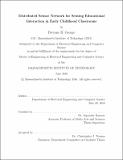| dc.contributor.advisor | Sepandar Kamvar. | en_US |
| dc.contributor.author | George, Dwyane B | en_US |
| dc.contributor.other | Massachusetts Institute of Technology. Department of Electrical Engineering and Computer Science. | en_US |
| dc.date.accessioned | 2016-12-22T15:18:57Z | |
| dc.date.available | 2016-12-22T15:18:57Z | |
| dc.date.copyright | 2016 | en_US |
| dc.date.issued | 2016 | en_US |
| dc.identifier.uri | http://hdl.handle.net/1721.1/106023 | |
| dc.description | Thesis: M. Eng., Massachusetts Institute of Technology, Department of Electrical Engineering and Computer Science, 2016. | en_US |
| dc.description | This electronic version was submitted by the student author. The certified thesis is available in the Institute Archives and Special Collections. | en_US |
| dc.description | Cataloged from student-submitted PDF version of thesis. | en_US |
| dc.description | Includes bibliographical references (pages 59-60). | en_US |
| dc.description.abstract | For teachers in Montessori schools, making notes of their observations of students is difficult, error prone, and does not scale well. Observations help teachers individualize their methods in early childhood classrooms. Sensei is the first system designed to measure social and classroom interaction using a distributed sensor network. Unobtrusive sensors measure proximity between each node in a dynamic range-based mesh network and establish interaction context through motion and ambient sound data. In this system, I designed a distributed sensor network protocol to collect sensory data, a synchronized network event scheduling scheme to establish a shared time basis, and a wireless data transfer protocol to facilitate data collection from the network. The network protocol interfaces with the sensor's hardware facilities to capture a high fidelity data set. The network event scheduling scheme creates a synchronized time basis that allows battery efficient data collection at a high time resolution for social interaction. The wireless data transfer protocol provides a teacher-friendly interface for extracting data stored in the network. This system is useful for further research in understanding learning and social networks in early childhood environments. Sensei is currently deployed in three Montessori schools and I have evaluated the effectiveness of the system with teachers. My contributions in this system are a protocol that captures sensory data, an event scheduling scheme that establishes a synchronized time basis, and a wireless data transfer protocol that facilitates data transfer from the network. Sensei helps discover observation insights that would have otherwise been lost. | en_US |
| dc.description.statementofresponsibility | by Dwyane B. George. | en_US |
| dc.format.extent | 60 pages | en_US |
| dc.language.iso | eng | en_US |
| dc.publisher | Massachusetts Institute of Technology | en_US |
| dc.rights | M.I.T. theses are protected by copyright. They may be viewed from this source for any purpose, but reproduction or distribution in any format is prohibited without written permission. See provided URL for inquiries about permission. | en_US |
| dc.rights.uri | http://dspace.mit.edu/handle/1721.1/7582 | en_US |
| dc.subject | Electrical Engineering and Computer Science. | en_US |
| dc.title | Distributed sensor network for sensing educational interaction in early childhood classrooms | en_US |
| dc.type | Thesis | en_US |
| dc.description.degree | M. Eng. | en_US |
| dc.contributor.department | Massachusetts Institute of Technology. Department of Electrical Engineering and Computer Science | |
| dc.identifier.oclc | 965830187 | en_US |
